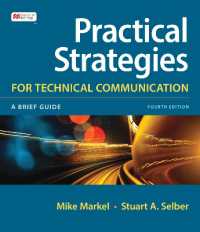- ホーム
- > 洋書
- > 英文書
- > Nature / Ecology
Full Description
This book is the first comprehensive book in the world on co-processing of wastes as Alternative Fuels and Raw materials (AFRs) in cement kilns. It discusses how AFR from wastes can play an important role in contributing toward reducing the use of fossil fuel and costs while conserving natural resources, lowering global CO2 emissions, and reducing the need for landfills. The use of AFR in resource and energy-intensive industries is called co-processing, which is discussed in detail highlighting both advantages and disadvantages. Co-processing in cement kilns is a technology that is practiced globally on a large scale for environmentally sound and ecologically sustaining management of wastes from agricultural, industrial, and municipal sources. Considerable amount of scientific and technological advancements has been put in place while developing and implementing this technology at the cement plant operational scales. This technology is in practice for about 40 years or so and hasbeen recommended by Basel Convention for the sustainable management of hazardous wastes and by the Stockholm Convention for the sustainable management of POPs. This technology has now been included in the waste management rules notified by the Ministry of the Government of India and has been provided as a preferred option for the management of wastes over the conventional options of incineration and landfill. The book addresses how co-processing promotes mitigation of the climate change impacts and also conservation of the natural capital in addition to building a circular economy on a large scale.
Even though this technology has received required attention and inclusion in the policy framework of many governments, its understanding and awareness with the stakeholders belonging to the academic and other relevant sections are vastly missing. The book will enhance the knowledge of co-processing technology among stakeholders involved in the implementation of the policy framework, design and engineering of the waste processing facilities to suit the co-processing operation, their operation and management, environmental consideration in implementing co-processing, operation and management of the cement plant, quality control, etc. In addition, the book will be useful for students and researchers working in this domain.
Contents
Introduction.- Types and composition of wastes.- Waste management rules in India and other countries focussing on co-processing.- Resource recovery options from wastes.- Hazardous waste treatment and disposal.- Evolution of co-processing as a disposal and energy recovery method.- Co-processing technology for waste recycling.- Strategies and policy advocacy.- Facilities for co-processing of wastes.- Facilities for pre-processing of wastes.- Design features involved in equipment and facilities for pre- and co-processing.- Operational considerations in pre- and co-processing of wastes.- Co-processing in power plant and steel plants.- Co-processing of POPs and DRE.- Mass and heat balance in co-processing.- Emission considerations involved in co-processing.- Development of co-processing technology in India and its status.- Co-processing scenario in other countries.- Business models associated with co-processing.- Sustainable supply chain for co-processing.- Co-processing and considerationson the cement quality.






